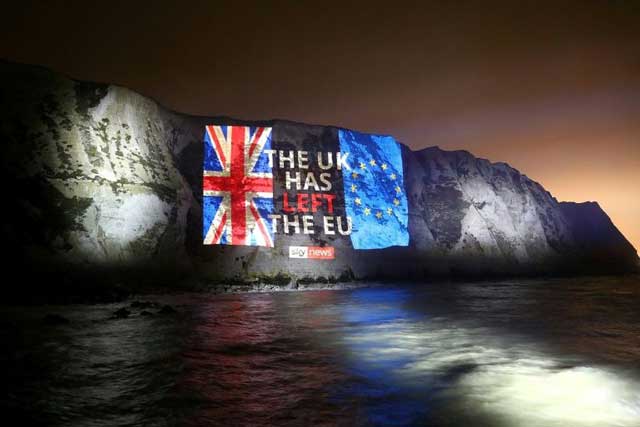
Aboard the Cote des Dunes, English Channel, United Kingdom | AFP | On a ferry from Calais to Dover, the moment of Britain’s dramatic exit from the European Union arrived without fuss.
There were no celebrations among the passengers as the clock struck midnight on one of the last ferries to leave the European mainland and make the 42-kilometre (26-mile) journey across the English Channel pre-Brexit.
Just sadness, and quite a bit of anger.
“It’s very depressing what’s happening today,” said Alessio Bortone, an Italian who has lived in Britain for 10 years.
The 42-year-old has a British wife and their children hold two passports. His work as a software engineer brings him regularly to the continent.
“I just crossed this afternoon four borders from Germany, the Netherlands, Belgium and France. That’s what we built as Europeans,” he told AFP as he boarded the ferry bringing him to his adopted home.
Having lived and worked in the UK for a decade, and owning a house there, he says he now has to apply for a residence permit, and his wife is seeking Italian citizenship in order to have a European passport.
“I’m paying for a right I used to have already… It’s lots of paperwork that was not necessary, a lot of expenses and time that we have to throw away for nothing really… It’s pointless.”
For Bortone and others aboard the Cote des Dunes ferry pulling away from mainland Europe and heading for a Britain about to end almost half a century of European Union membership, the 90-minute crossing had a sombre significance.
– ‘Idiots’ –
“My parents voted leave. Just idiots,” said 22-year-old British student Jamie Cunningham, shaking his head.
“It doesn’t seem worth the risk for me,” he told AFP in Calais, on his way home to Nottingham after a European skiing holiday.
“It affects personally a lot of people… There’s a lot of people working in Europe, working in the UK, that don’t actually know what is going to happen.”
An avid traveller, he feels cheated, and fears the EU bloc and its former ally may not be able to agree on unrestricted travel rules.
“I wouldn’t want to apply for a visa, I wouldn’t want to pay for a visa, obviously, every time I want to jump on a ferry, jump on a flight.”
For Romanian factory labourer Edward Maren, 24, who has worked on and off in Britain since 2013, it was a sad day.
“I don’t know… They want to be by themselves,” he said with a rueful shrug at a table with several friends, also from Romania.
– ‘A stupid idea’ –
“Many of the workers in the UK are foreign people, and if they stop welcoming them I don’t know if the UK will go upwards or downwards.
“I don’t have any problem moving in and out of the UK, but there are people who chase something better for their life, better money, better living, a better life, (for them) it will be quite hard.
Countries in Europe, said Maren, “should help each other, not just wall (ourselves) in.”
German Nick Schunke, 37, was blunt in his displeasure.
“It’s a stupid idea,” he told AFP.
“The UK has a stable economy with the rest of the EU and now they break those bonds just to be on their own again or to have deals with the US.”
Schunke, who has a British girlfriend, said he did not expect Brexit to affect him personally except “when I need a passport to travel.”
Not one of the ferry passengers approached by AFP approved of Brexit.
“You have an European Union acting as one… when required. It’s surely losing a strength for the UK to not be able to be on that stage,” said Cunningham.
Shortly after the Cote des Dunes docked in Dover, the port’s famous white cliffs, which are visible from France on a clear day, were lit up with a message beamed in from the sea through the rain and drizzle of the night.
“The UK has left the EU” it read, in between the Union Jack and EU flags.
“I’m very sad for my British friends,” said Bortone, who said his final pre-Brexit departure from the European continent was “very emotional.”
“I’m sure… one day they’ll come back. I hope so.”
 The Independent Uganda: You get the Truth we Pay the Price
The Independent Uganda: You get the Truth we Pay the Price



